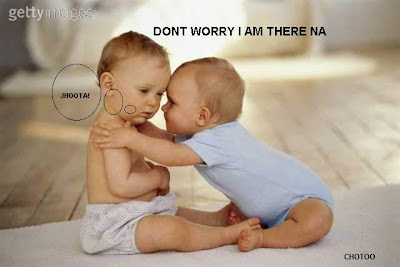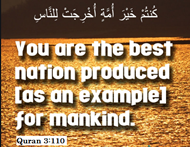better light a candle than curse the darkness |

Page-1|Page-2|Page-4|Page-5|Page-6|Page-7|Page-8| BaKhabar-Main Page |  Download pdf Download pdf
|
better light a candle than curse the darkness |

Page-1|Page-2|Page-4|Page-5|Page-6|Page-7|Page-8| BaKhabar-Main Page |  Download pdf Download pdf
|
| Emotional
Intelligence, Ramadan and Muslims -- Shakeel Ahmad (shakeeluae@gmail.com)
Ramadan, the holiest month for Muslims, comes and goes and many of us keep wondering what we gained from it, and how best to make use of the rest of the Ramadans that we may be fortunate to get. Apart from many spiritual and medical benefits cited by most of us, I feel Ramadan is far more than rituals that bring us closer to the Almighty, raise our claims to a seat in Jannah, or, makes us physically fit, and healthier. Through the various control mechanisms, Ramadan could easily make us more emotionally intelligent. Before we could answer how, let us understand what the intellectuals mean by Emotional Intelligence. Who does not have feelings? Who is without emotions? Do we not feel sometimes confident, sometimes nervous; sometimes happy, some other times sad? How do we manage to hide our sadness or happiness when we know the others might not like it? Don’t we manage them? What makes us feel at the top of the world one moment and at the great depths of depression the other moment? What makes us win people in a few seconds and what makes us ruin an age-old relationship in another few seconds? What makes one individual a winner in every negotiation and another a miserable loser all the time? What makes a leader and what a dumb follower? Are good scientists and professors good managers and leaders also, and successful leaders good teachers or parents? Why can’t all intelligent persons make use of their intelligence to the same extent, i.e., have the same level of IQ, and thus be successful to the same levels? Can the most intelligent Computer lead an organization, an institution, or a country? Emotion, perhaps, is the most important characteristic that could distinguish between the most intelligent and the most successful persons. Emotions are so important because our bodies need to communicate with us, and with others, to tell us what we need. Emotions also help us establish our boundaries. Additionally, emotions have the potential to unite and connect us. Emotions serve as our inner moral and ethical compass. Decisions affecting humans cannot be perfect using analysis or calculations alone; emotions are essential for good decision-making. Intelligence is just one characteristic of the human being. And just one characteristic cannot make an individual a leader, manager, professor or scientist. Because we are humans and humans are not without emotions, being intelligent is not enough for us to be able to succeed or lead. Because we have to deal with humans in all our roles, we must also learn to manage our emotions and guide them to a positive use. Unguided emotions are most likely to fail us whereas when channelized prudently and intelligently, the same emotions definitely could lead us to success every time. Like all the ingredients of a product, just by virtue of being put together in a place, cannot make a product, we can realize that all the characteristics already present within us cannot make us become what we wish to become. Through the science of Emotional Intelligence, an attempt is being made to make best use of the two most significant human characteristics, Emotions and Intelligence. In the words of Salovey and Mayer, who coined the term Emotional Intelligence in 1990, it is “a form of social intelligence that involves the ability to monitor one’s own and others’ feelings and emotions, to discriminate among them, and to use this information to guide one’s thinking and action.” In another place, they describe it as “the ability to perceive emotions, to access and generate emotions so as to assist thought, to understand emotions and emotional knowledge, and to reflectively regulate emotions so as to promote emotional and intellectual growth”. In the early 1990’s Daniel Goleman made the concept popular through his book, Emotional Intelligence. Goleman made EI easy to understand, by dealing with its five main components in details: 1. Self-awareness: Allah tells us our lowly status [created you out of dust, then out of sperm, then out of a leech-like clot, then out of a morsel of flesh, partly formed and partly unformed (Quran, 22:5)] or our status as the best of creatures [Quran, 3: 110, 95:5], commands us to be aware of what is right and what is wrong … … |
2. Emotional literacy (label emotions precisely, and be able to talk about feelings with others): Quran advises us to talk to Allah, seek strength or refuge, guidance or forgiveness, i.e., communicate our emotions with the belief that Allah answers all our prayers (Quran, 40:60) 3. Empathy and compassion
(ability to feel and understand the emotions of others): Throughout
Quran, Allah asks to care for ourselves, our families, our neighbours,
poor and destitutes, wayfarers, the indebted and the weak, animals and
all other creatures.
 5. Responsibility (taking primary responsibility for our own emotions and happiness. Not saying that others "made" us feel the way we feel): Allah crowns us the leadership of mankind (khalifa of Allah, on earth, e.g., in 2:30, 2:143, 3: 110, 22:78, and 38:26) which is given to only those who realize the importance of responsibility.  If we term Quran as the first book on emotional intelligence, it should not be an exaggeration. But, if we claim Quran is just about that, it could be limiting the value of Quran drastically, because Quran is far more than that. But yes, Quran definitely deals with the “emotional intelligence” aspects of human beings, and guides through emotionally intelligent ways to gain absolute and permanent success, making the best use of our emotions and intelligence (hikmah); being masters of our emotions or intelligence rather than being their slaves. Let us take a simple example from Quran, referring to anger (an evil). [Quran, 41: 34-36] Nor can goodness and Evil be equal (1*). Repel (Evil) with what is better (2): Then will he between whom and thee was hatred become as it were thy friend and intimate (3)! And no one will be granted such goodness except those who exercise patience and self-restraint (4),- none but persons of the greatest good fortune. And if (at any time) an incitement to discord is made to thee by the Evil One, seek refuge in Allah (5). He is the One Who hears and knows all things. *The numbers indicate the Goleman’s component of EI that the part of ayah may be considered as referring to. Applying wisdom, reflecting at the above verse, and at most verses of Quran, it becomes easy to understand that Allah wants us to be the best of people, that which He created us initially (in the state of fitrah, i.e, purity), emotionally intelligent and much more.  Ye are the best of peoples, evolved for mankind, enjoining what is right, forbidding what is wrong, and believing in Allah. If only the People of the Book had faith, it were best for them: among them are some who have faith, but most of them are perverted transgressors. [Quran, Chapter #3, Verse #110)  "> "> |
|
Participate
in a good cause;
write to admin@biharanjuman.org
|
|
Home | About Us | Objective | Scholarship | Matrimonial | Video Library | Projects | Quran Resources | Lend a hand |